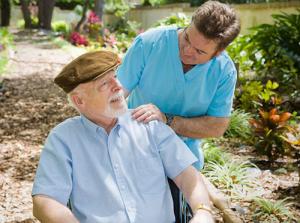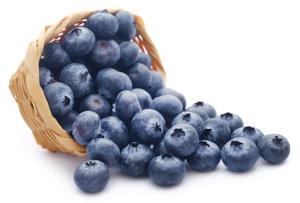by Amber Kevlin, RN | Sep 28, 2023 | Senior Home Care
Everyone knows that high blood pressure is a danger to your health, but low blood pressure, also called hypotension, is rarely talked about. While for the most part, low blood pressure is not an emergency situation unless you experience unsettling symptoms, it’s still best to keep a close eye on, and report any low readings and side effects to your primary care physician.
Low blood pressure means that the force needed to push blood throughout the body is lower than it should be. If you are not feeling any effects, you may be fine without interventions, but what makes low blood pressure so dangerous is the risk it can pose to seniors for falls when light-headedness and dizziness are effects. An extremely low blood pressure can even cause shock or even death. This may happen when organs are deprived of the oxygen and nutrients they need to function.
 At this time, the regularly accepted “normal” blood pressure reading is 120/80 mm Hg or lower. But just like every other regulatory system in the body, this number can change due to many circumstances, such as age, lifestyle choices (drinking alcohol and smoking tend to raise blood pressure), as well as stress levels and nutrition. A slight rise may be normal for someone 80 years old, with a reading of 138/86 mm Hg.
At this time, the regularly accepted “normal” blood pressure reading is 120/80 mm Hg or lower. But just like every other regulatory system in the body, this number can change due to many circumstances, such as age, lifestyle choices (drinking alcohol and smoking tend to raise blood pressure), as well as stress levels and nutrition. A slight rise may be normal for someone 80 years old, with a reading of 138/86 mm Hg.
So, what is considered low blood pressure in seniors?
Typically, any reading of 90/60 mm Hg or below is a low reading. If you or a loved one are experiencing any of the listed signs and symptoms of low blood pressure, please seek medical advice immediately:
- Weakness
- Extreme fatigue
- Fainting
- Rapid or irregular heartbeat
- Nausea
- Blurry vision
- Confusion
- Shallow breathing
If you aren’t experiencing severe symptoms but feel a bump in your blood pressure may be warranted to reduce mild symptoms, try these tips at home:
- Increase sodium intake, wisely. Make sure a doctor can advise you for an increase in sodium intake in your health care plan.
- Drink more water! An increase in fluids means an increase in fluid volume, therefore raising blood pressure and preventing senior dehydration.
- Compression stockings can help circulate blood from the legs back to the heart.
- Exercise regularly. Yes, you see this a lot, but because it’s truly so helpful in every aspect of personal health care.
While these tips may help at home, make sure to always keep your doctor informed of any lifestyle changes, and if any symptoms persist or interfere with your daily life. Medications may be prescribed to help with low blood pressure.
Are you or a loved one looking for help at home? My Choice Home Care is a senior home care service company that serves clients in Macon, Jackson, and Haywood Counties in North Carolina. Counties served in Georgia are Rabun, Towns, and Habersham. Counties served in Upstate South Carolina are Oconee, Pickens, and Anderson. Email us or call (828) 200-9000 to speak to someone today if you or a loved one would like to enjoy the benefits of living independently in your own home. We offer a free Senior Care Options guide to help you navigate Medicare, Medicaid and other programs for seniors.
by Amber Kevlin, RN | Sep 24, 2023 | Senior Home Care
Strokes can happen at any time, anywhere, to anyone. It also means that every stroke survivor recovers at different rates, depending on many different factors.
However, there are ways to encourage “neuroplasticity,” or to give your brain a boost in growth that can make stroke recovery more efficient.
Guidance for Recovering from a Stroke:
 Repetition is essential in recovering lost skills due to a stroke. Repetition helps to rewire the brain and overcome memory loss by providing stimulation. Some repetitive movements such as leg exercises may help a survivor regain the ability to walk again.
Repetition is essential in recovering lost skills due to a stroke. Repetition helps to rewire the brain and overcome memory loss by providing stimulation. Some repetitive movements such as leg exercises may help a survivor regain the ability to walk again.- On the other hand, don’t overdo it. The body and brain do need rest to heal stroke symptoms, and overexertion can extend your road to recovery.
- Even if you are unable to do certain physical stroke recovery exercises, give it a try anyway, as long as it’s safe. Does tying your shoelaces seem impossible? Keep trying, and don’t get discouraged. These skills will be hard to recover if you refuse to try.
- If speech is an issue, use mobile apps to improve! There are many apps online that are good for speech therapy, using repeat-back technology to gauge words and sounds, and offer encouraging tips.
- Use respite care. There are resources available to seniors and those in need of some extra care, or help for their family that are also caregivers. Look into local in-home service agencies that can provide aides to help around the house, or with personal care needs, such as bathing or grooming.
Recovery isn’t a straight line. There may be dips, regressions, or plateaus, but don’t give up! Stay consistent, and stay positive during your stroke healing journey.
At home stroke recovery can be challenging, but it is far from impossible. Understand and accept that recovery takes time. Develop your healing practice by building a practical stroke recovery timeline.
Make a promise to yourself of being gentle and compassionate with your body and mind. This is foundational to overcoming the obstacles that a stroke presents. If you feel overwhelmed or discouraged, ask for help. And when help is offered, it’s okay to accept.
Looking for help at home? My Choice Home Care is an in-home elderly home care service that serves clients in Macon, Jackson, and Haywood Counties in North Carolina. Counties served in Georgia are Rabun, Towns, and Habersham. Counties served in Upstate South Carolina are Oconee, Pickens, and Anderson. Email us or call (828) 200-9000 to speak to someone today if you or a loved one would like to enjoy the benefits of living independently in your own home. We offer a free Senior Care Options guide to help you navigate Medicare, Medicaid and other programs for seniors.
by Amber Kevlin, RN | Sep 19, 2023 | Senior Home Care
 Senior memory loss is inevitable for the aging adult, but the degree can vary immensely. Everyone experiences lapses in memory sometimes, but there are things that seniors can do to improve their memory, and prevent further issues down the road.
Senior memory loss is inevitable for the aging adult, but the degree can vary immensely. Everyone experiences lapses in memory sometimes, but there are things that seniors can do to improve their memory, and prevent further issues down the road.
Being proactive to prevent memory loss doesn’t have to be difficult. Small changes in daily habits won’t take up to too much time and energy, and the payoff is invaluable. Working to improve your cognitive abilities can make a world of difference in quality of life, for you and your loved ones as well.
The key to mental stimulation is change and challenge. Your brain already knows how to do the things you’re already good at. Try something new! Taking up a new hobby requires lots of brainpower, and as a bonus can help with keeping physical as well.
Some new experiences elderly seniors can enjoy may include:
- Genealogy research
- Learning a new language
- Learning social media/ using the internet
- Volunteering at the local shelter
- Reading to children at the local library
- Learning new gardening techniques

There are certain foods packed with vitamins that help prevent senior memory loss. Some foods include:
- Fatty fish, like salmon, anchovies, and whitefish
- Blueberries
- Broccoli
- Coffee
- Nuts
- Dark chocolate (yay!)
- We discuss some ways to improve eating habits here.
While there are supplements that also may help with memory loss, make sure to check with your primary care physician before taking anything over the counter, as they may interfere with prescription medication.
Some more organic ways to prevent senior memory loss and take care of your brain include routine daily exercise (no matter how small), a healthy diet, and even some fun brain puzzles. Try your hand at the weekly crossword puzzle or Sudoku , or even a good old-fashioned jigsaw puzzle, available at most local dollar stores.
Taking care of your brain is just as important as taking care of your body, and just like your body, it’s a “use it or lose it” type of situation. Taking small steps to improve your brain health can mean a much easier, healthier life down the road. Here are some more signs and tips from the National Institute On Aging to help you and your loved ones. It’s important to be able to detect Alzheimer’s and Depression when memory loss is a challenge.
My Choice Home Care is a senior home care service that serves clients in Macon, Jackson, and Haywood Counties in North Carolina. Counties served in Georgia are Rabun, Towns, and Habersham. Counties served in Upstate South Carolina are Oconee, Pickens, and Anderson. Email us or call (828) 200-9000 to speak to someone today if you or a loved one would like to enjoy the benefits of living independently in your own home. We offer a free Senior Care Options guide to help you navigate Medicare, Medicaid and other programs for seniors.
 At this time, the regularly accepted “normal” blood pressure reading is 120/80 mm Hg or lower. But just like every other regulatory system in the body, this number can change due to many circumstances, such as age, lifestyle choices (drinking alcohol and smoking tend to raise blood pressure), as well as stress levels and nutrition. A slight rise may be normal for someone 80 years old, with a reading of 138/86 mm Hg.
At this time, the regularly accepted “normal” blood pressure reading is 120/80 mm Hg or lower. But just like every other regulatory system in the body, this number can change due to many circumstances, such as age, lifestyle choices (drinking alcohol and smoking tend to raise blood pressure), as well as stress levels and nutrition. A slight rise may be normal for someone 80 years old, with a reading of 138/86 mm Hg.
 Repetition is essential in recovering lost skills due to a stroke. Repetition helps to rewire the brain and
Repetition is essential in recovering lost skills due to a stroke. Repetition helps to rewire the brain and  Senior memory loss is inevitable for the aging adult, but the degree can vary immensely. Everyone experiences lapses in memory sometimes, but there are things that seniors can do to improve their memory, and prevent further issues down the road.
Senior memory loss is inevitable for the aging adult, but the degree can vary immensely. Everyone experiences lapses in memory sometimes, but there are things that seniors can do to improve their memory, and prevent further issues down the road.
Recent Comments